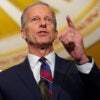Facebook shareholders will have the opportunity Thursday to vote in favor of “true diversity” as the company holds its annual investor meeting.
In the past few weeks, Apple, Amazon, and Twitter all have rejected the same shareholder resolution calling for the technology companies to seek “ideological diversity among their board members” that “contemplates differences in political/policy beliefs.”
>>> Update: Facebook investors rejected the “true diversity” proposal Thursday along with seven other independent shareholder proposals.
The negative vote tallies do not come as a surprise to Justin Danhof, a lawyer who heads up the Free Enterprise Project, an initiative of the National Center for Public Policy Research, a conservative think tank based in Washington.
>>> Related: ‘We’re the Ones Yelling Stop’: How These Conservatives Are Fighting Corporations’ Liberal Tilt
For years, liberal groups have been much more organized than conservatives as shareholder activists, Danhof told The Daily Signal in a phone interview.
The upshot is that it is “super easy” for more individuals and groups on the right to enter the fray during shareholder meetings, where they can advance resolutions and raise questions about company policies, he said.
“We need to get more conservatives involved, and what I tell people is to please copycat me and take a look at what we’re doing with the Free Enterprise Project,” Danhof said. “If the left can do this, how hard can it be? They know how to push companies. But to file a resolution, all you need is $2,000 [worth] of a stock.”
Facebook was the scene of internecine warfare in October 2016 after a conservative board member, PayPal founder Peter Thiel, contributed $1.25 million to Donald Trump’s presidential campaign.
At the time, Facebook CEO Mark Zuckerberg ended up defending Thiel and political differences, as The Verge reported, writing to employees of the social media giant: “We can’t create a culture that says it cares about diversity and then excludes almost half the country because they back a political candidate.”
Thiel later sold the bulk of his remaining Facebook stock while retaining a seat on the board, where he remains.
Avoiding ‘Groupthink’
The Free Enterprise Project, which began in 2007, works to promote free market ideals in corporate settings on topics that include health care, energy, taxation, government regulations, religious freedom, media bias, and Second Amendment rights.
The project’s representatives have attended more than 100 shareholder meetings, including 22 so far this year, according to a press release.
Danhof is responsible for authoring the “true diversity” proposal for ideological breadth on corporate boards, and for presenting it to shareholders and company officials.
His full statements at the Amazon and Twitter shareholder meetings are available here. The version of the diversity proposal that Facebook shareholders are slated to consider Thursday is available here, listed as proposal eight on the Facebook’s proxy statement.
“The stated goal of diversity is a good goal, because you want the board to avoid groupthink,” Danhof said. “You don’t want everyone marching off the ledge in lockstep. But the way companies go about it is all wrong because they are only looking at gender and race, and that’s sexist and racist. If the companies really support diversity in the truest sense of the word, they would support our proposal.”
Because the Securities and Exchange Commission mandates a 500-word limit for shareholder proposals, they cannot be exhaustive, Danhof laments. But he said he can make his case during a shareholder meeting, and the supporting statement included with proposals can raise awareness among investors.
“There are a number of reasons why a company can kick out your proposal,” Danhof said. “In fact, most of the time companies will fight like heck to get your proposal removed any way they can. The SEC will also look for reasons. So sometimes we have to make them sound a little more bland than we want.”
But because the Free Enterprise Project found a way to “reverse engineer” diversity proposals from liberal groups that focused on gender and race, conservative shareholder activists are able to spark a meaningful debate about the importance of ideological diversity, David Almasi, vice president of the National Center for Public Policy Research, said in an interview with The Daily Signal.
“The idea is for a company to look for different viewpoints when they are looking for new [board] members,” Almasi said. “If the board is all liberal you will want to balance this out by getting a conservative, and if the board is all conservative you want to try and find someone who is liberal. You are not going to have much success as a company if everyone is thinking the same way.”
What Conservatives Need
Before conservatives can achieve parity with their liberal counterparts in corporate boardrooms, they will need to develop their own proxy advisory service, Danhof said.
This became apparent to the head of the Free Enterprise Project during Amazon’s 2018 shareholder meeting.
The Seattle, Washington-based technology company initially resisted a proposal co-sponsored by the Service Employees International Union and CtW Investment Group. It would require women and minorities to be included in the “initial list of candidates from which new management-supported director nominees are chosen.” But Amazon ultimately capitulated, Danhof said.
Amazon removed the race- and gender-based proposal, which may be read here, before the shareholder meeting because corporate leaders decided to adopt it as policy without debate, according to a press release from the National Center for Public Policy Research.
“I flew out to Seattle for the sole reason of standing up at the shareholder meeting and telling investors to vote down the proposal,” Danhof told The Daily Signal. “But when I got in line, the lawyer I normally deal with told me the board had already adopted the proposal and that it was now policy.”
“Amazon had been fighting this proposal and had been standing firm for a good month,” he said. “But at the 11th hour, with their tail between their legs, they adopted this proposal. So, what happened?”
The answer, Danhof said, is that one of the country’s largest and most influential proxy advisory companies, Institutional Shareholder Services, came out publicly in favor of the diversity proposal that SEIU backed in partnership with CtW Investment Group.
Proxy advisory services make recommendations about corporate resolutions and actions.
“Institutional Shareholder Services leans dramatically to the left,” Danhof said. “But they are the most important proxy advisory service in America. The [Amazon] lawyer said to me that because ISS came out in favor of this diversity proposal based on race and gender, what else were they supposed to do? They felt like they had no choice. That’s how powerful just one proxy advisory service is, and conservatives need to develop their own.”
‘Not Appropriate Topic’
The Daily Signal sought comment from Institutional Shareholder Services, including about whether its recommendations were closely tied to left-of-center policy preferences.
In response, Subodh Mishra, the organization’s executive director of communications, told The Daily Signal that it does not comment on specific resolutions or meetings.
But Institutional Shareholder Services recommended a vote against the Free Enterprise Project’s diversity proposal at Facebook’s meeting for two reasons, writing to investors:
Facebook provides information regarding the experience and qualifications of director nominees; and
The practice is not an appropriate topic of inquiry in the nomination or selection process because political ideology should play no role in the execution of board responsibilities.
The Daily Signal also sought comment from Apple, Twitter, and Amazon about the criticisms from the Free Enterprise Project. Apple had not responded by the time of publication and Amazon declined to comment.
A spokesperson for Twitter, however, provided a statement in an email:
Diversity of thought and background is a core aspect of Twitter’s existing Corporate Governance Guidelines for identifying directors. We believe that Twitter’s board should be diverse and comprised of directors with a multitude of backgrounds, experiences, and perspectives, reflecting the global nature of our business and the diverse viewpoints of our users, customers, employees, and other stakeholders.
Proxy statements from companies include reasons a board recommends voting for or against each shareholder proposal.
The Free Enterprise Project’s “true diversity” proposal is listed as proposal five on Apple’s proxy statement, proposal 12 on Amazon’s statement, proposal eight on Facebook’s statement, proposal six on Twitter’s statement, and proposal six on Salesforce’s statement.
Hearing Dissenting Opinions
“Just putting people on your board based on skin color or gender instead of their expertise is bad for business,” Danhof said. “This doesn’t serve the corporate interest.”
In drafting the proposal for the Free Enterprise Project, Danhof said, he emphasized the need to interview people with a range of viewpoints for board positions.
“I also added in ideology as something to consider in this day and age when companies are very political and take a lot of political actions,” he said, adding:
This is especially true in Silicon Valley, where the companies could benefit from someone with a conservative point of view. I do think it helps the bottom line if you have people with dissenting opinions in the room. From a business perspective, it also makes sense to have someone [with a different view] in the room if you are making political decisions that are not tethered to your business. If some corporate action is going to offend a whole swath of your customers or investors, it’s good to know this.
A week after the scheduled vote Thursday at Facebook’s shareholder meeting on the Free Enterprise Project’s “true diversity” proposal, the San Francisco-based software company Salesforce is slated to take it up at a June 6 shareholder meeting.
The Daily Signal sought comment on the proposal from Facebook and Salesforce, both of which opposed it in their proxy statements.
Representatives of both companies said they had no comment beyond those statements.
Ken McIntyre contributed to this report.
































